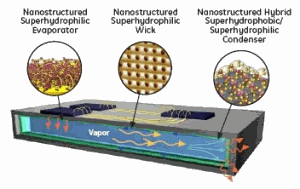March 16, 2011 – BUSINESS WIRE — Scientists in GE’s Global Research Center have demonstrated an advanced thermal material system that could pave the way to faster computing and higher performing electronic systems. Leveraging technologies developed under GE’s Nanotechnology Advanced Technology Program, they have fabricated a prototype substrate that can cool electronic devices better than copper.
 |
| Figure. A diagram of GE’s advanced thermal material system. Leveraging unique surface engineered coatings that both repel and attract water, GE’s system achieves twice the heat conducting properties of copper and can function under extreme forces of gravity. |
The development of GE’s prototype substrate, which utilizes phase-change-based heat transfer, is part of a 4-year, $6 million program funded by the Defense Advanced Research Program Agency (DARPA, Contract # No. N66001-08-C-2008). GE Global Research has been collaborating with GE Intelligent Platforms, the Air Force Research Laboratory, and University of Cincinnati on the project.
GE’s phase-change based prototype substrate can be applied to computer chips and different electronic components. It acts as a cooling mechanism that spreads or dissipates the heat generated in electronic systems to keep components cool.
"In demonstrations, GE’s prototype substrate has functioned effectively in a variety of electronics application environments. We also subjected it to harsh conditions during testing and found it could successfully operate in extremely high gravity applications," said Dr. Tao Deng, a senior scientist at GE Global Research and the project leader.
During testing at the Air Force Research laboratories, GE’s research team successfully demonstrated a prototype substrate that was measured to have at least twice the thermal conductivity as copper at only one-fourth of its weight. In addition, the prototype successfully operated in a condition that was more than 10 times normal gravity.
With high thermal conductivity, low weight, and high-G acceleration performance, this substrate could work well in laptop computers to sophisticated computing systems that run the avionics and electronic control systems on board jetliners and other aircraft.
In collaboration with various agencies from the US government, GE Global Research has been developing several advanced thermal technologies. Besides the DARPA effort, Dr. Deng is also leading a team, supported by Air Force Research Laboratory, to develop advanced thermal solutions for high-speed flight in a 1.5-year, $1 MM effort. These efforts will build a total thermal solution platform to serve multiple GE businesses, including GE Aviation, GE Energy, and GE Intelligent Platforms.
GE Global Research is the hub of technology development for all of GE’s businesses. Visit GE Global Research on the web at www.ge.com/research.
Follow Small Times on Twitter.com by clicking www.twitter.com/smalltimes. Or join our Facebook group

